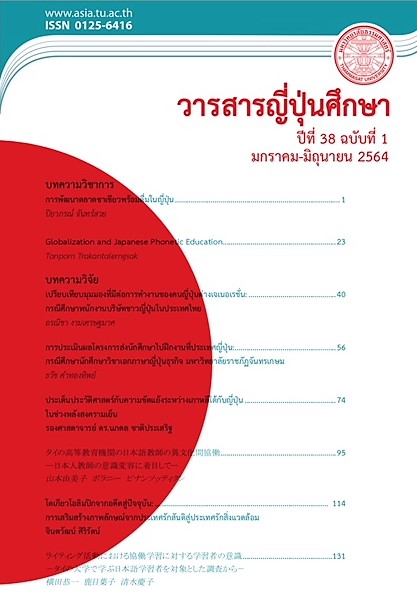เปรียบเทียบมุมมองที่มีต่อการทำงานของคนญี่ปุ่นต่างเจเนอเรชั่น: กรณีศึกษาพนักงานบริษัทชาวญี่ปุ่นในประเทศไทย
คำสำคัญ:
สังคมญี่ปุ่น, มุมมองต่อการทำงาน, เจเนอเรชั่น, การทำงานแบบญี่ปุ่น, บริษัทญี่ปุ่นบทคัดย่อ
การศึกษาเรื่องเปรียบเทียบมุมมองที่มีต่อการทำงานของคนญี่ปุ่นต่างเจเนอเรชั่น: กรณีศึกษาพนักงานบริษัทชาวญี่ปุ่นในประเทศไทย มีวัตถุประสงค์เพื่อศึกษาความเหมือนและแตกต่างของมุมมองเกี่ยวกับการทำงานของพนักงานชาวญี่ปุ่นในแต่ละเจเนอเรชั่นที่ทำงานอยู่ในประเทศไทยว่ามีความเหมือนหรือต่างกับการทำงานแบบญี่ปุ่นอย่างไร และมุมมองที่มีต่อการทำงานร่วมกับคนจากต่างเจเนอเรชั่นก่อให้เกิดอุปสรรคหรือเอื้อประโยชน์ต่อการทำงานอย่างไร เพื่อเสริมสร้างความเข้าใจเกี่ยวกับการทำงานของพนักงานบริษัทชาวญี่ปุ่นในประเทศไทยและ เป็นแนวทางนำมาใช้อ้างอิงในการทำงานร่วมกับพนักงานชาวญี่ปุ่น วิธีการศึกษาได้แก่ ศึกษาเอกสาร สร้างแบบสอบถาม และสำรวจความคิดเห็นของกลุ่มตัวอย่างพนักงานบริษัท ชาวญี่ปุ่นในประเทศไทยต่างเจเนอเรชั่นจำนวน 140 คน
ผลการศึกษาพบว่ากลุ่มตัวอย่างแต่ละเจเนอเรชั่นมีมุมมองต่อการทำงานที่ต่างกันในบางเรื่อง เช่น ความเชื่อมั่นที่มีต่อบริษัท ความเคร่งครัดในการทำงาน โดยกลุ่มตัวอย่างเจเนอเรชั่นชินจินรุอิมีมุมมองต่อการทำงานที่ต่างจากเจเนอเรชั่นอื่นมากที่สุด และแม้กลุ่มตัวอย่างเป็นพนักงานชาวญี่ปุ่นที่ทำงานในประเทศไทย แต่ยังพบมุมมองต่อการทำงานที่เหมือนการทำงานแบบญี่ปุ่น โดยเฉพาะอย่างยิ่งการชื่นชอบการทำงานเป็นกลุ่มและการมีความจริงจังเคร่งครัดในการทำงาน
กลุ่มตัวอย่างมีมุมมองต่อการทำงานร่วมกับคนต่างเจเนอเรชั่นว่าช่วยเอื้อประโยชน์ต่อการทำงาน เนื่องจากช่วยให้เห็นมุมมองความคิดเห็นที่นอกเหนือไปจากมุมมองของคนเจเนอเรชั่นเดียวกันซึ่งสามารถนำมาใช้ในการปรับปรุงพัฒนาวิธีการทำงานของตนเอง และสร้างความเข้าใจเกี่ยวกับมุมมองที่มีต่อการทำงานของเจ้านายและเพื่อนร่วมงานได้มากขึ้น รวมถึงช่วยให้เกิดความเข้าใจเกี่ยวกับมุมมองของกลุ่มลูกค้า ซึ่งเป็นกลุ่มคนจากหลายเจเนอเรชั่นเช่นกัน
ข้อมูลที่ได้จากการศึกษามีประโยชน์ต่อพนักงานชาวไทยในการทำความเข้าใจและทำงานร่วมกับพนักงานชาวญี่ปุ่นที่เข้ามาทำงานในประเทศไทยอีกทั้งบริษัทร่วมทุนญี่ปุ่นในประเทศไทยสามารถนำข้อมูลไปใช้อ้างอิงในการการสร้างกิจกรรมเพื่อพัฒนาทักษะในการทำงานของพนักงานหรือปรับปรุงรูปแบบการทำงานเพื่อเสริมสร้างความสัมพันธ์ระหว่างพนักงานที่มีความแตกต่างกันทั้งเจเนอเรชั่นและเชื้อชาติให้มากขึ้น
Downloads
เอกสารอ้างอิง
Dokuritsu Gyousei Houjin Roudou Seisaku Kenkyuu Kenshuu Kikou. (2006). Shosa Shiriizu No.20 Hatarakikata no Genjyou to Ishiki nikansuru Annkeeto Chosa kekka. Retrieved from https://www.jil.go.jp/institute/research/2006/020.html (in Japanese)
Foreign Direct Investment. (2019). Foreign Direct Investment Statistics and Summary Years 2019 January – December. Retrieved from https://www.boi.go.th/index.php?page=statistics_oversea_report_st (in Thai)
Kanokpanthorn, L. (2012). Generation Gap Management to Develop Human Resources in Organization. Panyapiwat Journal, 3(2), 132-143. Retrieved from https://so05.tci-thaijo.org/index.php/pimjournal/article/view/12019 (in Thai)
KouseiRoudouShou. (2011). Heisei 23 Nenban Roudou Keizai no Bunseki - Sekaigoto ni Mita Hatarakikata to Koyoukanri no Doukou-. Retrieved from https://www.mhlw.go.jp/wp/hakusyo/ roudou/11/ (in Japanese)
Kurozumi, H. (2015). “Yaritaikoto wo Yaru”Atsukai Nikui “Post Dankai Jr. Sedai” no Sesshi Kata. Retrieved from https://president.jp/articles/-/18301 (in Japanese)
Maita, T. (2016). “Dankai, Dankai Jr., Yutori” 3 Sedai Sorezore no Jinseiki. Retrieved from https://www.newsweekjapan.jp/stories/world/2016/01/post-4324.php (in Japanese)
Montipa, W. (2009). Theory J Management Affecting Employee’s Work Efficiency of Thai Toray Synthetics co., ltd. [Master’s Project, Srinakharinwirot University]. Retrieved from http://thesis.swu.ac.th/swuthesis/Man/Montipa_W.pdf (in Thai)
Nareenoot, D. (2017). Transition of Japanese Social Values Since World War II: A Generational Theory Approach. Japanese Studies Journal, 7(1), 86-102. Retrieved from https://www.tci-thaijo.org/index.php/jsn/article/view/78627 (in Thai)
Nareenoot, D. (2019). Modern Japanese: Social, Politic, Economy and Cultures. NIDA. (in Thai)
Nihon Nouritsu Kyoukai. (2019). 2019 Nendo Shinnyou Shainn Ishikichousa Houkoku Sho. Retrieved from https://www.jma.or.jp/img/pdf-report/new_employees_2019.pdf (in Japanese)
Paranee, K. (1978). Joint Venture in Thailand: The case study of Japanese-Thai Joint Venture company. [Master’s thesis, Thammasat University]. TU Digital collections. Retrieved from http://digital.library.tu.ac.th/tu_dc/frontend/Info/item/dc:119338 (in Thai)
Phetcharee, R. (2017). Management Styles Learning: Cross-Cultural Management. D.K.edition. (in Thai)
Pornthip, W. (2012). Dispatched employees in Japanese society (Haken rodosha). [Master’s thesis, Thammasat University]. TU Digital collections. Retrieved from http://digital.library.tu.ac.th/tu_dc/frontend/Info/item/dc:98059 (in Thai)
Ratchanee, P. (2018). Thai Interpreters’ Roles and Problems in Cultural Differences in the Context of Japanization: A Case Study of Japanese Enterprises in the Industrial Estate of Thailand. Journal of Language Religion and Culture, 7(2), 51-90. Retrieved from https://so03.tci-thaijo.org/index.php/gshskku/article/view/137056 (in Thai)
Sununta, S. (2015). Japanese-Style Human Resource Management in Thailand. Japanese Studies Journal, 32(2), 1-17. Retrieved from https://www.tci-thaijo.org/index.php/japanese/article/view/ 51118 (in Thai)
Supawadee, T. (2010). Theory Z organizations relating to Thai employee s’ satisfaction in Working Life Quality and Overall Organizational Commitment in Bangkok metropolitan area. [Master Project, Srinakharinwirot University]. Retrieved from http://thesis.swu.ac.th/swuthesis/Man/Supawadee _T.pdf (in Thai)
Supitchaya, S., Jeerasak, R., Kritsana, P., Theerath, P. (2013). The Comparison of Organization Culture in Japanese and American Companies Related to Work Effectiveness of Employee in AMATA NAKORN Industrial Estate, Chonburi Province. Journal of Graduate School of Commerce Burapha Review, 8(2), 68-85. Retrieved from http://www.ex-mba.buu.ac.th/webJGSC/Journal/ Volume_8-2/67-85.pdf (in Thai)
Suwannee, T. (1998). Communication behavior, job satisfaction and adaptation of Japanese working in Thailand. [Master’s thesis, Chulalongkorn University]. Retrieved from http://cuir.car.chula.ac.th/ handle/123456789/10097 (in Thai)
Takaoka,K. (2016). “Dankai” “Baburu” “Rosujene” “Yutori” Sarariiman SedaironKai wo Sagashi ni - Hikizan no Sekai (1). Retrieved from https://www.nikkei.com/article/DGXMZO98989500Z2 0C16A3I10000/ (in Japanese)
Warintorn, W., Suneerat, N., Piyanuch, W. and Yukie, N. (2019). Japanese ways of molding quality people. Thammasat University Press (in Thai)




